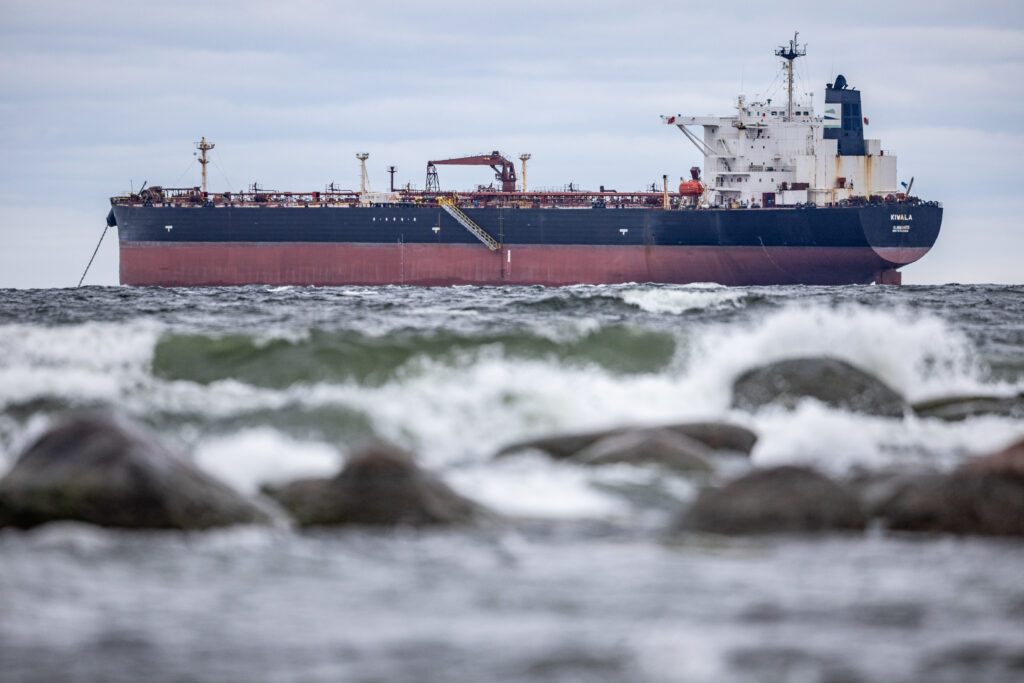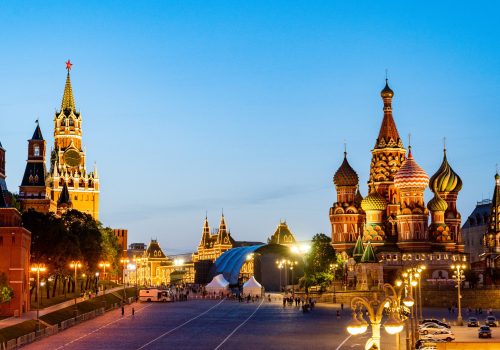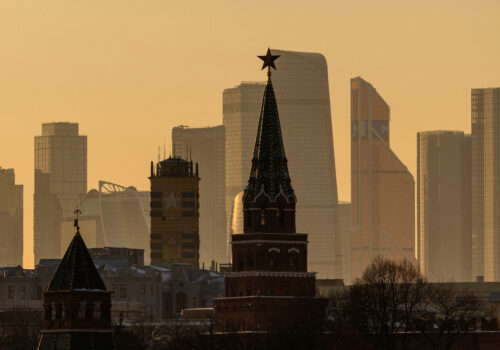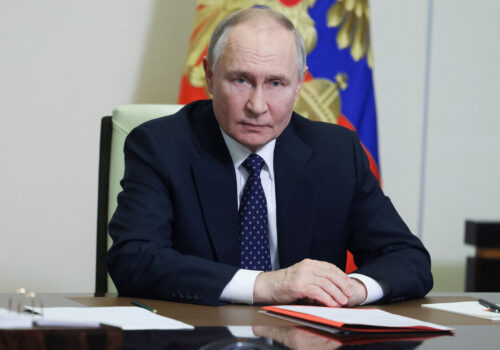Brussels and London are ratcheting up pressure on Moscow—without Washington. On Tuesday, the European Union (EU) and the United Kingdom approved scores of new sanctions against Russia, including the EU more than doubling the number of oil tankers and other vessels listed as part of the “shadow fleet” covertly trading Russian oil and gas. The EU package—the seventeenth since Russia’s war against Ukraine began—also adds new sanctions on individuals and companies, including the Russian oil giant Surgutneftegas. “This round of sanctions on Russia is the most wide-sweeping since the start of the war,” EU foreign policy chief Kaja Kallas said. Below, Atlantic Council experts shine a light on the sanctions and what they reveal about Europe’s faceoff with Russia.
Click to jump to an expert analysis:
Kimberly Donovan: Sanctions are a powerful, yet slow-burning tool
Rachel Rizzo: Europe is no longer waiting for the United States to act
Elisabeth Braw: Spotlight who is replenishing Russia’s shadow fleet, too
Aleksander Cwalina: There is still more the EU can do to tighten the screws to Russia
Olga Khakova: If Trump also goes after the shadow fleet, it could bring Putin to the table
Sanctions are a powerful, yet slow-burning tool
The EU’s seventeenth package is a welcome addition to the extensive sanctions the Group of Seven-plus (G7+) coalition maintain on Russia in response to Russia’s ongoing war in Ukraine. The latest package further brings EU sanctions in line with US and UK designations on Russian oil producers including Surgutneftegas, as well as the ongoing strategy to target Russia’s illicit oil trade using shadow fleet vessels.
The extent and timing of this latest sanctions package demonstrate Europe’s resolve to maintain economic pressure on Russia, and they are a clear signal that Europe maintains strong economic leverage in potential negotiations with Russia to end the war.
It’s hard not to notice that the sanctions were announced the day after US President Donald Trump spoke with Russian President Vladimir Putin and posted on social media that “Russia wants to do largescale TRADE with the United States when this catastrophic ‘bloodbath’ is over, and I agree.” There is growing concern about a potential divergence in US and EU foreign policy, and the latest EU package is a strong reminder that EU sanctions could remain in place even if Washington decides to ease its sanctions or open avenues for trade and finance with Moscow.
That said, EU sanctions require renewal every six months and need consensus by all twenty-seven members. If the United States does not maintain economic pressure on Russia, then there is concern that Hungary may break with the bloc and veto EU sanctions on Russia’s economy when they are up for renewal in July.
Sanctions are a powerful, yet slow-burning tool. The multilateral sanctions that G7+ coalition partners levied against Russia are finally having the intended effect. Russia’s economy is struggling, interest rates and inflation remain high, Russia is drawing down on its National Welfare Fund, and the country is in a wartime economy. This is why Moscow’s primary demand from the Black Sea cease-fire talks was lifting sanctions.
To get a better and bigger deal with Russia over the war in Ukraine, it would be in Washington’s best interest to not only engage its European allies in negotiations, but also to join them in issuing additional sanctions to deny Moscow the opportunity to gain leverage at the negotiation table.
—Kimberly Donovan is the director of the Economic Statecraft Initiative at the Atlantic Council’s GeoEconomics Center. She previously served in the federal government for fifteen years, most recently as the acting associate director of the Treasury Department Financial Crimes Enforcement Network’s Intelligence Division.
Europe is no longer waiting for the United States to act
The latest round of EU sanctions against Russia highlights the EU’s willingness to do something it hasn’t yet done since February 2022: take ownership over the outcome of Russia’s war in Ukraine. The United States has always been in the driver’s seat, with the Biden administration both shaping and leading the West’s response to the war. The re-election of Trump brought an almost 180-degree shift in the US approach, with a much more conciliatory tone toward Russia emanating from the White House, along with a hope that Trump’s dealmaking skills could get both sides to the table for a cease-fire. That approach has yet to bear fruit.
This is where the EU’s pressure becomes important. It highlights the bloc’s willingness to act independently of the United States and use its own tools to get Russia to the table without waiting for the United States to provide political cover. With European Commission President Ursula von der Leyen leading the charge, the hope is that the EU stays united on the sanctions front for the foreseeable future, squeezing Russia’s war machine (and its broader economy) to the point where Putin has no other choice than to stop the war.
—Rachel Rizzo is a nonresident senior fellow at the Atlantic Council’s Europe Center. Her research focuses on European security, NATO, and the transatlantic relationship.
Spotlight who is replenishing Russia’s shadow fleet, too
Every sanction helps reduce the shadow fleet’s activities, and the EU’s diligent efforts to identify shadow vessels are to be saluted. The EU should be especially proud of its latest package, which includes sanctions against an extraordinary 189 shadow vessels and some of the ships’ owners. The latter is especially important, since the owners do their best to operate in the shadows and are extremely hard to trace.
However, the shadow fleet’s main characteristic remains in place: the fact that it can be constantly replenished. It can be replenished because there are ship owners willing to sell their retirement-age ships into the shadow fleet. In fact, doing so is commercially advantageous for them: Retiring old vessels involves paying for them to be scrapped, while selling them into the shadow fleet brings in money—a lot of it.
Unfortunately, a few shipowners, including in Western countries, undermine sanctions against Russia by selling their ships into the shadow fleet. Perhaps even worse, by doing so, they willingly create risks on the high seas, because shadow vessels pose hazards to other vessels, to the maritime environment, and to coastal states. Publishing their names would send a strong message.
—Elisabeth Braw is a senior fellow with the Atlantic Council’s Transatlantic Security Initiative in the Scowcroft Center for Strategy and Security.
There is still more the EU can do to tighten the screws to Russia
On the sidelines of the G7 finance ministers’ meetings in Banff, Canada, this week, the United States opposed language in a joint statement that included “further support” for Ukraine. The United States also expressed reluctance to describe the Russian full-scale invasion of the country as “illegal,” further distancing Washington from its G7 counterparts. This follows a concerning trend as Trump has talked about Washington stepping back in peace talks and eventually restarting US trade with Russia.
In contrast, the European Commission pushed forward and adopted its seventeenth sanctions package against Russia, underlining European Union unity and clarity. The package closed some remaining loopholes that allow Russia to fund its war machine and access key Western technology for military use. In doing so, it reiterated EU solidarity with Ukraine.
The package was received well in Kyiv, with Ukrainian President Volodymyr Zelenskyy calling the newest round of sanctions “strong” and saying that they will limit Moscow’s ability to continue its invasion.
However, more can be done to tighten the screws on Russia.
Kyiv and its European allies are already discussing how to raise the stakes in a harsher eighteenth EU sanctions package if Moscow does not make serious efforts toward a cease-fire. This would most likely target the Russian banking and energy sectors and aim to further limit the Russian shadow fleet that Moscow uses to evade maritime trade restrictions. The EU and its partners should continue to target these industries. The bloc should also seriously consider seizing assets from sanctioned individuals in the EU for Ukraine and implementing secondary sanctions that limit third-party purchasing of Russian oil—both steps recommended by Kyiv.
As European leaders are becoming increasingly frustrated with Washington’s stalling and Putin’s faux negotiations and maximalist demands, the EU should lead by example and take bold steps to continue aiding Ukraine and putting pressure on Russia.
—Aleksander Cwalina is an assistant director at the Atlantic Council’s Eurasia Center.
If Trump also goes after the shadow fleet, it could bring Putin to the table
Putin’s strategy of buying time with deceitful “peace” promises is shown to be failing in the face of the new EU and UK sanctions, as funding for Moscow’s war starts to run out.
The shadow fleet carries more than 60 percent of Russian oil exports, according to a recent estimate, and the new sanctions will help strengthen enforcement of the price-caps mechanism on Russian oil. Currently, there are some discussions at the G7 level on lowering the price cap for the next sanctions package. But lowering the price cap will only impact Russia if it is enforced. Otherwise, Russia will continue to send large quantities of its oil through the shadow fleet, ensuring it continues to rake in profits.
In addition to curtailing Russia’s oil profits, the shadow fleet sanctions protect European coastlines from the potential environmental damage and sabotage that the Russian shadow fleet could cause. Europe is achieving this by refusing the provision of services, insurance, and port access to these metal-scrap grade ships.
The United States has already sanctioned 183 vessels. Now, Trump has an opportunity to forge his legacy as a peacemaker by joining the EU and UK sanctions on 342 vessels to bring Putin to the negotiating table. Moscow will only take US pressure seriously if it is implemented with decisiveness and strength—something the Trump administration has demonstrated effectively in tough negotiations with other nations.
—Olga Khakova is the deputy director for European energy security at the Atlantic Council’s Global Energy Center.
Further reading
Thu, Apr 17, 2025
Russia Sanctions Database
Econographics By Kimberly Donovan, Maia Nikoladze, Lize de Kruijf
The Atlantic Council’s Russia Sanctions Database tracks the level of coordination among Western allies in sanctioning Russian entities, individuals, vessels, and aircraft, and shows where gaps still remain.
Wed, Mar 26, 2025
There’s a right way to lift sanctions on Russia. Follow these Dos and Don’ts.
New Atlanticist By Daniel Fried, Kimberly Donovan
A former US diplomat and a former US Treasury official offer eleven guiding principles for moving forward in negotiations on sanctions relief with Russia.
Mon, Mar 17, 2025
Enough carrots for Putin. For better negotiations, serve ‘maximum pressure’ instead.
New Atlanticist By
Since Russia appears content for negotiations to move slowly, the Trump administration should turn up the pressure with new sanctions.
Image: Estonian authorities detained an oil tanker which forms part of Russia's "shadow fleet" and which had been sailing through Estonian waters in the Gulf of Finland. The vessel Kiwala is not permitted to sail on the open seas. Photo Eero Vabamägi, Postimees via REUTERS




